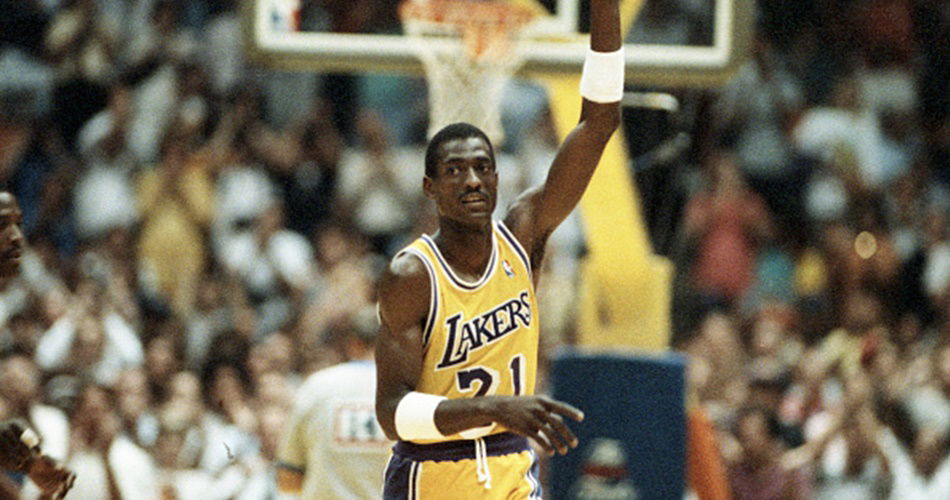
Imago
Laker forward Michael Cooper raises his finger to signify the Lakers are #1 at the end of the game 6/4. Cooper threw in 6 three point baskets in 7 tries.

Imago
Laker forward Michael Cooper raises his finger to signify the Lakers are #1 at the end of the game 6/4. Cooper threw in 6 three point baskets in 7 tries.
How great is Michael Cooper? This year, it was announced that Cooper will be inducted into the Hall of Fame, and the LA Lakers are set to retire his jersey number #21. His teammate, the iconic Kareem Abdul-Jabbar, expressed his admiration, saying, “I really appreciate being Coop’s teammate. He really helped me succeed.” It’s no surprise, considering Cooper played a pivotal role in securing five of the Lakers’ 17 championship banners.
Watch What’s Trending Now!
Growing up in California, he spent most of his career racking up accolades, including those coveted five championships and the 1987 Defensive Player of the Year award. However, beyond the trophies and applause lies a world of challenges that shaped him into the player and person he is today.
ADVERTISEMENT
Early struggle and NBA
At just three years old, he suffered a severe accident that left him with a knee injury requiring a staggering hundred stitches. Doctors told his parents, Marshall and Jean, that he might never walk again. Yet, against all odds, that very boy defied expectations, walking onto NBA courts and contributing to championship wins.
Then there’s his early athletic career. After shining at Pasadena High School, Cooper transferred to Pasadena City College and later to the University of New Mexico. There, he averaged 16.3 points, 5.7 rebounds, and 4.2 assists, leading the Lobos to a WAC title. Despite his impressive stats, he entered the 1978 NBA draft without much fanfare, not as a top prospect but as someone ready to prove himself.
Top Stories
Did NBA Fine Derrick White and Grady Dick for Exchanging Jerseys? Fact Checking Viral News
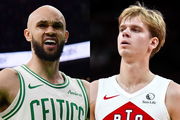
What Happened to Draymond Green? Warriors Star Heads to Locker Room in 3rd Quarter vs. Magic
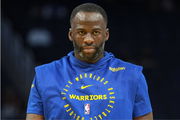
Orlando Magic vs. Golden State Warriors Player Stats, Box Score and Game Recap (Dec 22) – 2025–26 NBA Season
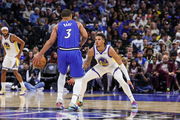
Steve Kerr Announces Decision on Warriors Future Amid Uncertain Contract Situation

Is Steph Curry Playing Tonight? Latest Magic vs Warriors Injury Report (Dec 22)
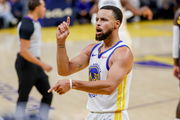
When the Lakers selected him in the third round as the 60th overall pick, they had no idea they were welcoming an essential part of the Showtime Lakers. Cooper quickly established himself as one of the best defenders in the game, thrilling home crowds with chants of “Cooooop.” His defensive prowess was so exceptional that even Larry Bird admitted Cooper was the toughest player to get past, culminating in his well-deserved Defensive Player of the Year title in 1987.
ADVERTISEMENT
Off-court struggles
It wasn’t just the Atlanta Dream’s court that Michael Cooper had to battle on in 2014. While coaching the WNBA team, he found himself in a much more personal fight—one for his health. Diagnosed with tongue cancer, Cooper had to undergo surgery, removing 55 lymph nodes and receiving around 40 stitches. Yet, amidst all this, he was largely on his own, with his wife Yvonne and their four kids—Michael, Simone, Miles, and Nils—still back in LA.
ADVERTISEMENT
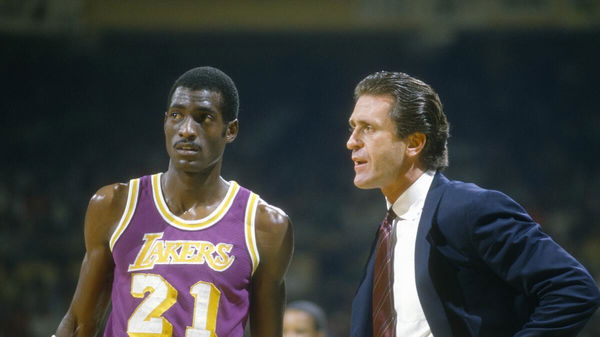
Getty
UNSPECIFIED – CIRCA 1985: Head Coach Pat Riley of the Los Angeles Lakers talks with his player Michael Cooper #21 during an NBA basketball game circa 1985. Riley coached the Lakers from 1981-1990. (Photo by Focus on Sport/Getty Images)
Reflecting on that summer, Cooper shared, “When I was first diagnosed in the summer of 2014, I had never heard of tongue cancer and I was stunned when I was told that the sore on my tongue was early-stage cancer and I needed surgery immediately.” His revelation came during the 20th annual Oral, Head & Neck Cancer Awareness Week in 2018, shedding light on how unexpected and terrifying the experience was for him.
Despite the six-inch scar that curves from his left ear to the front of his neck, hidden beneath his facial hair, Cooper never allowed cancer to sideline him for long. In fact, just 10 days after surgery, he was back to coaching the Dream. He even joked that the slur left by his surgery made him more intimidating when arguing with referees. It was this resilience that saw him stay with the team until 2017, a testament to his dedication and unyielding spirit.
ADVERTISEMENT
However, at first, Cooper didn’t think many people noticed his absence or cared until icons like Magic Johnson, Kareem Abdul-Jabbar, and Pat Riley reached out to him. “It’s silly to think Los Angeles could forget Cooooop,” he realized. With his #21 jersey soon to hang in the rafters, it’s clear that no one ever will.
Cooper promoting awareness
Back in 2018, Michael Cooper teamed up with the Head and Neck Cancer Alliance, using his platform to spread a critical message about the importance of early detection. His involvement was part of a nationwide campaign aiming to encourage people to get screened for oral, head, and neck cancers.
ADVERTISEMENT
“The ball is in your court…get yourself screened,” Cooper urged in the event, hoping his words would inspire others to take control of their health.
At the time, over 300 locations across the U.S. offered free screenings as part of the 20th annual Oral, Head & Neck Cancer Awareness Week. These events provided a crucial opportunity for people to catch potential issues before they became more serious. Early detection, as Cooper and the campaign emphasized, could be life-saving.
Dr. Terry Day, President of the Head and Neck Cancer Alliance, echoed the importance of these screenings, specifically highlighting how oropharyngeal cancer linked to HPV showed better outcomes with modern treatment. “People with oropharyngeal cancer caused by HPV have a better prognosis than those who are negative for the virus,” Dr. Day explained, emphasizing how new research is making a significant difference in survival rates.
ADVERTISEMENT
ADVERTISEMENT
ADVERTISEMENT
ADVERTISEMENT

